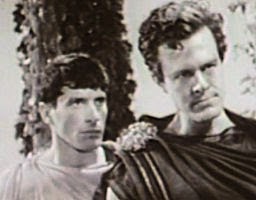My daughter gets part of the blame for this. Back when she was a senior in high school, she and some friends convinced a colleague to teach a little philosophy course for them. My colleague was a philosopher at heart and jumped at the chance, even though it added to his teaching load.
Skip ahead a decade and my colleague retired. I inherited teaching the course (but as part of my regular teaching load).
As an undergrad, I'd been intimidated by higher math and by my mathlete friends who were fans of the philosophy department's logic courses. I avoided both disciplines as much as possible.
 |
| Walter Cronkite in '53 |
Somewhere along the way I read Plato's
Apology. My understanding of it benefited from a 1953 CBS episode of
You Are There in which actual CBS reporters "showed up" at the prison where the Socrates was orating and interviewed observers. Some of the actors in the scene were Robert Culp as Xenophon and E. G. Marshall as Aristophanes. Paul Newman and John Cassavetes are both given credit for playing Plato at IMDB.com. Walter Cronkite was the anchor at the studio desk and interacted with the reporters at the scene. Oh, and Sidney Lumet directed this episode. The TV production was based on a 1948 radio script.
 |
| Cassavetes as Plato; Culp as Xenophon |
That's how shallow my understanding was. (Go ahead. Ask me if I get sidetracked sometimes.)
Luckily, my colleague left behind lots of great teaching ideas. I got interested. Since I couldn't ad lib about anything philosophical, I had to read a lot on my own and come up with teaching ideas too. And I think I created some good ones.
All that is prologue to reading
Anthony Gottlieb's review of
Rebecca Newberger Goldstein's book,
Plato at the Googleplex, Why Philosophy Won't Go Away. A couple people later panned the review, but it persuaded me to buy (yes, buy) a copy of the book and dig into it. (That digging took awhile. That's why I haven't written anything here for six weeks.)
There are two kinds of chapters in the book. One set of chapters are essays on Platonic and Socratic ideas and the culture in which they were created. The one I latched on to best primarily addressed the question of why the 4th century BCE in Greece was different from the centuries that preceded it in other places. Other chapters describe the culture of Athens, explain Socrates' decision to die, and analyze Plato's famous cave.
Alternating with those chapters are episodes in which Plato appears in the present-day United States. He visits a philosophy class. He goes on a book tour to promote his work that includes a stop at the
Googleplex, the corporate headquarters of Google, Inc. to discuss crowdsourced ethics, a debate at the 92nd Street Y about child rearing, a session with Dear Margo, helping her answer questions from readers, an interview with a dismissive, right-wing radio host, and a session with a neuroscientist and a cognitive scientist about free will. That debate ends as the scientists are about to observe the operation of Plato's brain using functional magnetic resonance imaging (fMRI).
In each of these chapters about the 2400-year-old philosopher visitng the USA, there's a dialogue. Maybe they're modeled on dialogues Plato wrote. (Someone more knowledgeable will have to tell us.) But for the first time I sort of understood what was being debated. I reveled in those chapters. In his review, Gottlieb suggested that the philosophical essays were more valuable and the imaginary dialogues could have been omitted. I think the opposite is true. I read the words of the essays, but I didn't struggle to understand them. I did concentrate on the dialogues. The book is over 400 pages. I'd be okay with losing the essays.
So now it's up to you to read
Plato at the Googleplex (I think it's worth the time) and tell us what you thought of it.
Write and tell this little bit of the world.
Or, if you've read something else you would like to recommend or advise avoiding, you can
write too.










